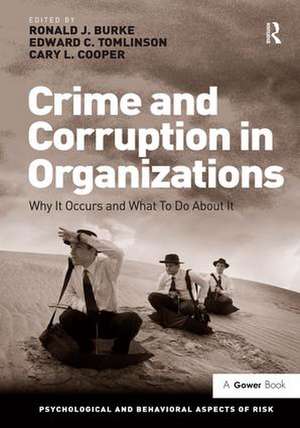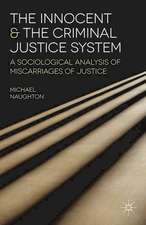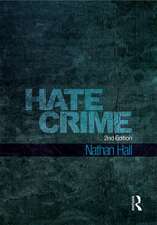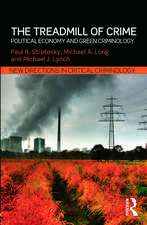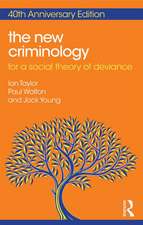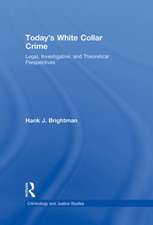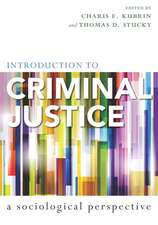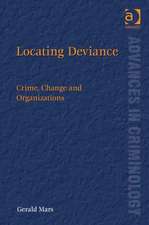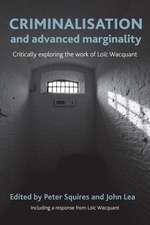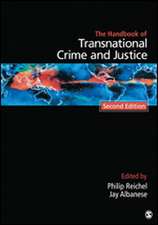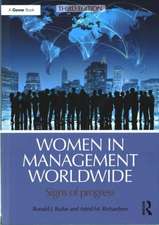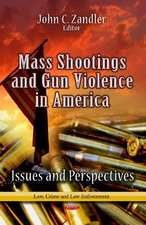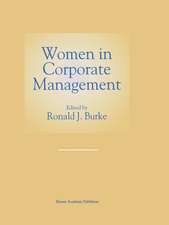Crime and Corruption in Organizations: Why It Occurs and What To Do About It: Psychological and Behavioural Aspects of Risk
Autor Ronald J. Burke, Edward C. Tomlinsonen Limba Engleză Hardback – 21 dec 2010
Preț: 828.87 lei
Preț vechi: 1145.73 lei
-28% Nou
Puncte Express: 1243
Preț estimativ în valută:
158.60€ • 165.61$ • 130.97£
158.60€ • 165.61$ • 130.97£
Carte tipărită la comandă
Livrare economică 16-30 aprilie
Preluare comenzi: 021 569.72.76
Specificații
ISBN-13: 9780566089817
ISBN-10: 0566089815
Pagini: 382
Dimensiuni: 174 x 246 x 29 mm
Greutate: 0.95 kg
Ediția:1
Editura: Taylor & Francis
Colecția Routledge
Seria Psychological and Behavioural Aspects of Risk
Locul publicării:Oxford, United Kingdom
ISBN-10: 0566089815
Pagini: 382
Dimensiuni: 174 x 246 x 29 mm
Greutate: 0.95 kg
Ediția:1
Editura: Taylor & Francis
Colecția Routledge
Seria Psychological and Behavioural Aspects of Risk
Locul publicării:Oxford, United Kingdom
Cuprins
Contents: Part I Introduction: Crime and corruption in organizations, Ronald J. Burke. Part II Causes of Crime and Corruption in Organizations: Show me the money, Ronald J. Burke; Predicting workplace misconduct using personality and academic behaviors, Thomas H. Stone, I. M. Jawahar, and Jennifer L. Kisamore; The role of trust in employee theft, Edward C. Tomlinson; The influence of national culture on the rationalization of corruption, Amy Guerber, Aparna Rajagoplan and Vikas Anand. Part III Costs of Crime and Corruption in Organizations: The debilitating effects of fraud in organizations, Conan C. Albrecht, Matthew L. Sanders, Daniel V. Holland and Chad Albrecht; A re-examination of the withdrawal syndrome vis-à-vis organizational ethics in schools, Zehava Rosenblatt and Orly Shapira-Lishchinsky. Part IV Corruption in the Professions: Making sense of academic misconduct, Alison L. Antes and Michael D. Mumford; Medicines and money: the corruption of clinical information, Joel Lexchin. Part V Reducing Crime and Corruption in Organizations: How to minimize corruption in business organizations: developing and sustaining an ethical corporate culture, Mark S. Schwarz; Confronting corruption using integrity pacts: the case of Nigeria, Wesley Cragg, Uwafiokun Idemudia and Bronwyn Best; Easy prey Canadians, L.S. (Al) Rosen; Index.
Recenzii
'...a wide-ranging and careful analysis of wrong-doing (whether unlawful or merely dubious) in business...' - Professional Security 'The book Crime and Corruption in Organizations: Why it Occurs and What to Do About It represents a timely and interesting blend of empirical and conceptual research on crime and corruption in organizations. The articles included in this book offer fresh and insightful perspectives related to the causes of organizational transgressions and the costs these transgressions pose to organizations and society. The text begins with a comprehensive introduction to the topic and continues with a discussion of the systemic causes of organizational crime and corruption and their effect on different countries and industries. Organizational corruption is discussed from multiple view points. The articles motivated many interesting discussions with my peers and students.' Anke Arnaud, College of Business, Embry-Riddle Aeronautical University, USA
Notă biografică
One of Canada's most prolific researchers, Professor Burke's work has focused on the relationship between the work environment and individual and organizational health. He was the Founding Editor of the Canadian Journal of Administrative Sciences and has served on the editorial boards of more than a dozen journals. He has served as Director of the PhD. Programme at Schulich, and as Associate Dean for Research. He has participated in research conferences in North and South America, the UK, Europe, Asia and Australia. Professor Burke earned his PhD from the University of Michigan and is Professor Emeritus of Organizational Behavior. He has published over 500 journal articles and edited or co-edited 27 books with a variety of publishers. He has participated in over 300 management development programs as well as serving as a consultant on organizational effectiveness issues for private and public sector organizations. His views on management and organizations have also appeared in various media. Edward C. Tomlinson is an associate professor of management and Mulwick Scholar in the Boler School of Business at John Carroll University. He received his Ph.D. from the Fisher College of Business at The Ohio State University. His primary research interests include interpersonal trust, behavioral integrity, and deviant workplace behavior. His research has been published in journals including Academy of Management Review, International Journal of Conflict Management, Journal of Applied Psychology, Journal of Management, and Journal of Management Education. He currently serves on the inaugural editorial board of Journal of Trust Research. Cary L. Cooper, CBE, is Distinguished Professor of Organizational Psychology and Health, Lancaster University Management School at Lancaster University, England. He is the author of over 100 books and 400 scholarly articles, and is a frequent contributor to national newspapers, TV and radio. He is currently Founding Editor of the Journal of Organizational Behavior and Editor in Chief of the medical journal Stress & Health. He is past President of the British Academy of Management, is a Companion of the Chartered Management Institute and one of the first UK based Fellows of the (American) Academy of Management. Professor Cooper is also the President of the Institute of Welfare Officers, President of ISMA, President of the British Association of Counselling and Psychotherapy, President of RELATE and Chair of the Academy of Social Sciences. In 2001, Cary was awarded a CBE by the Queen in the Queen's Birthday Honours List for his contribution to organizational health.
Descriere
This volume examines the causes and consequences of crime and corruption in organizations, and the choices we face in our efforts to eradicate these social maladies. This is the most up-to-date thinking on both classic and novel approaches to crime and corruption, and covers the most scientifically-grounded approaches to reducing illicit behaviour in organizations.
